NORTH CAROLINA BOARD OF PHARMACY
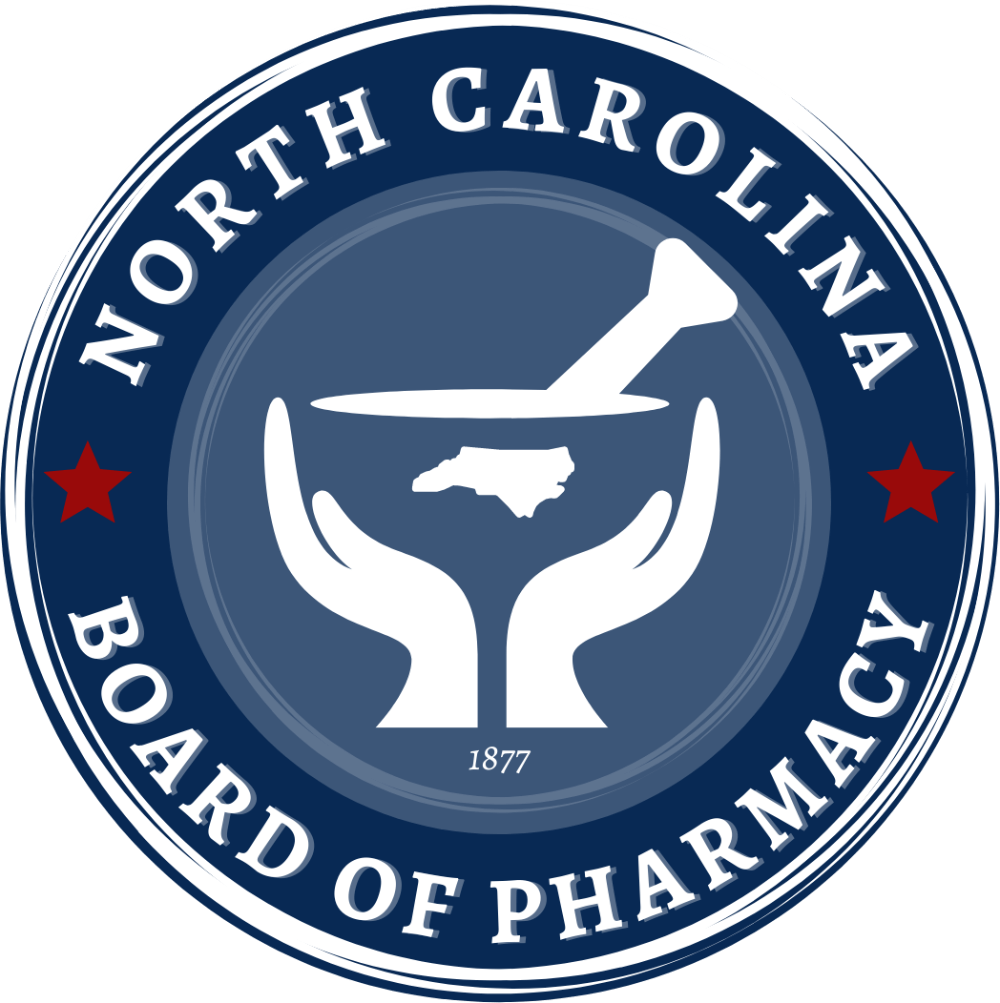
LICENSURE GATEWAY
The Gateway is a single portal to manage licenses, permits, and registrations with the North Carolina Board of Pharmacy. Access printable documents, update information, submit applications, and more.
Go to the Gateway-
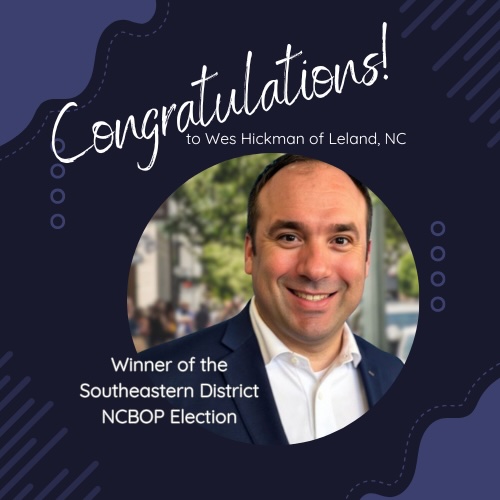
NC PHARMACISTS ELECT WESLEY HICKMAN TO SERVE ON THE BOARD FROM THE SOUTHEASTERN DISTRICT
NC Board of Pharmacy members and staff congratulate Wes Hickman of Leland, NC, on being elected to serve a five-year term beginning May 1. A total of 1,333 pharmacists voted in this election between November 1 and March 1. The Board also extends its thanks to current member Robert “Joey” McLaughlin, Jr., for his candidacy and his continued commitment to public service.
SE District NCBOP Election Results
-

RULEMAKING NOTICE: PROPOSED ADOPTION OF 21 NCAC 46 .2517 INFLUENZA TEST AND TREAT
Session Law 2025-37 authorized pharmacists to test and treat patients for influenza. That authority was first implemented by two standing orders issued by the State Health Director on September 30, 2025, after input from stakeholders. Pharmacists have implemented the standing orders since then with no reported incidents. Following issuance of the standing orders, the Session Law directed the Board of Pharmacy and the Medical Board to adopt rules and protocols. Each Board has proposed adopting protocols that are substantively identical to the standing orders, and has proposed the rules that incorporate the protocols by reference.
Rulemaking Notice Influenza Test & Treat
-
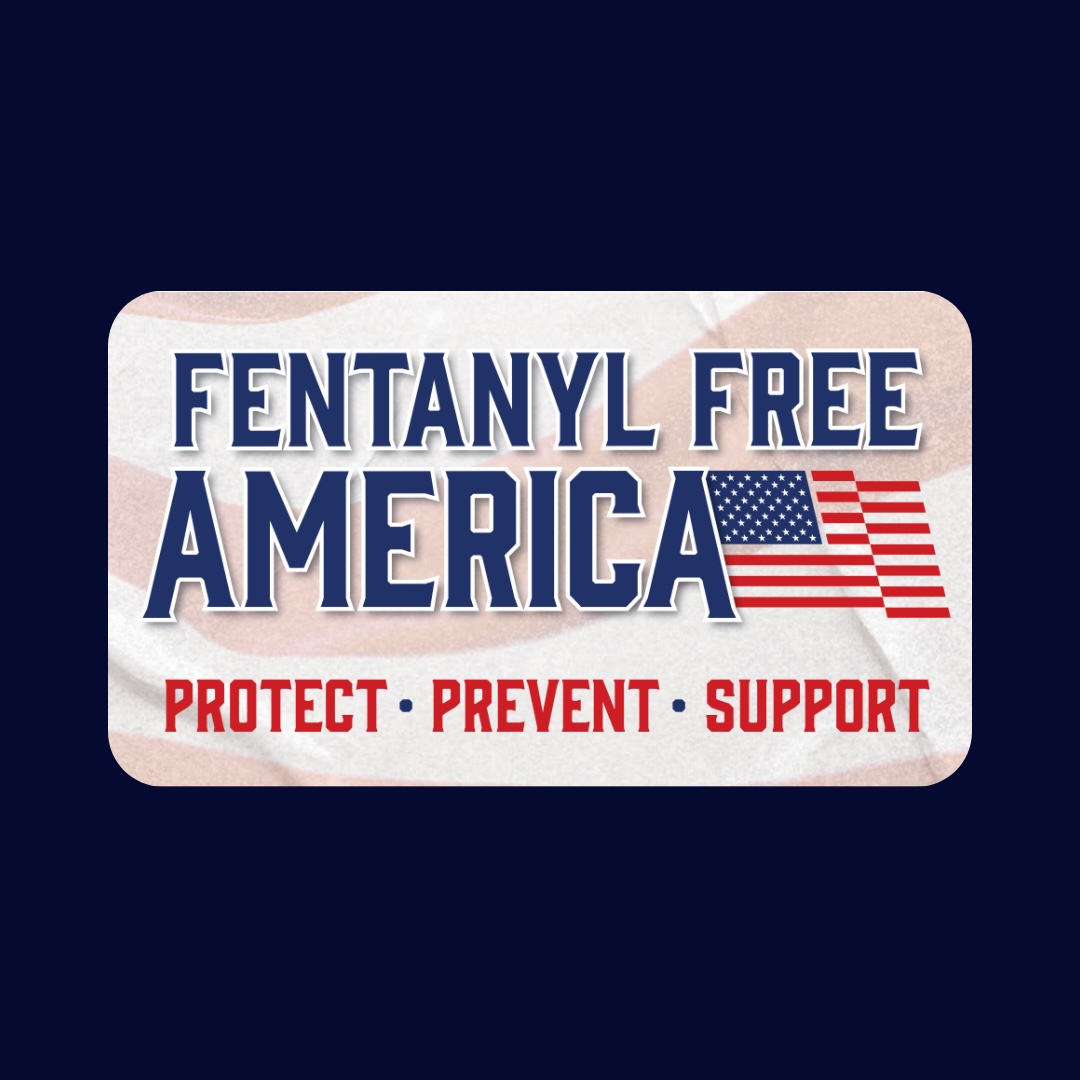
DRUG ENFORCEMENT ADMINISTRATION PROVIDES MATERIALS TO SUPPORT FENTANYL FREE AMERICA INITIATIVE
The federal Drug Enforcement Administration (DEA) is distributing materials to assist the public in reducing fentanyl overdoses. Pharmacists may find this information useful in their practices.
Fentanyl Free America
-

*UPDATED JANUARY 21, 2026* NC BOARD OF PHARMACY WILL TRANSITION TO THE UNIFORM MULTISTATE JURISPRUDENCE EXAM FOR LICENSURE EFFECTIVE APRIL 1, 2026
Effective April 1, 2026, the North Carolina Board of Pharmacy will require passage of the uniform version of the Multistate Pharmacy Jurisprudence Examination® (MPJE®) as a condition for pharmacist licensure and will no longer offer or require the North Carolina MPJE for all licensure applicants. Follow this link for all details regarding the new UMPJE™, including instructions and FAQs for new graduates and those seeking licensure in North Carolina.
MPJE® / UMPJE® Details
-
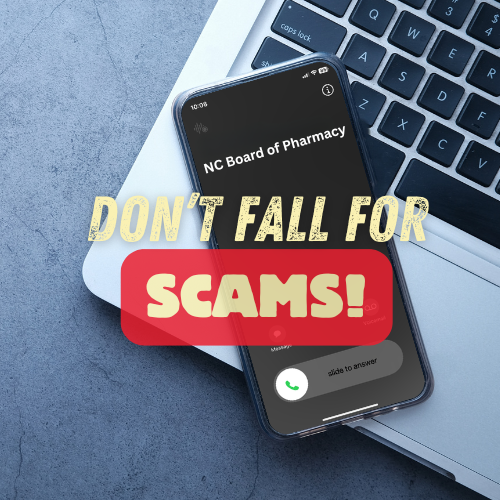
*ALERT* PHARMACISTS AND PHARMACY PERSONNEL WARNED OF SCAM COMMUNICATIONS PURPORTING TO BE FROM NCBOP STAFF
Don’t fall victim to scammers! Pharmacists continue to report receiving calls from individuals purporting to be Board investigators/inspectors. The Board’s telephone number, (919) 246-1050, is often what appears on caller ID. Such calls as of late inform the pharmacist that they are the target of an investigation involving illegal drug activity and the caller sometimes claims to be part of a larger FBI (or SBI, DEA or other agency) investigation.
Read more about scams targeting pharmacists
-

DRUG ENFORCEMENT ADMINISTRATION EXTENDS COVID-19 TELEMEDICINE FLEXIBILITIES FOR CONTROLLED SUBSTANCE PRESCRIPTIONS THROUGH DECEMBER 31, 2026
The Drug Enforcement Administration (DEA) and the federal Department of Health and Human Services have jointly issued a fourth temporary rule extending the current telemedicine flexibilities, which allow the prescribing of controlled substances without a prior in-person evaluation through December 31, 2026. The primary goal of this extension is to prevent a “telemedicine cliff” regarding patient access to care. [continued below]
Read more about the extension
-
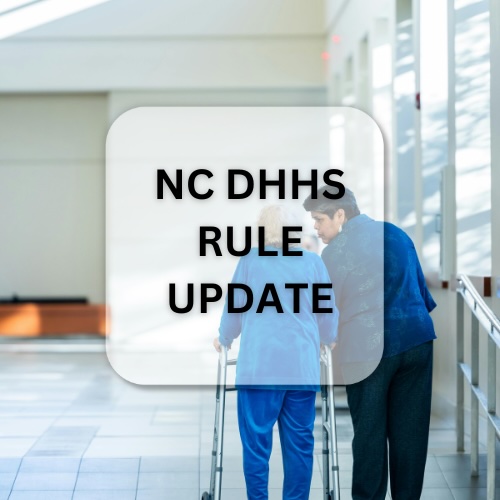
NORTH CAROLINA DEPARTMENT OF HEALTH AND HUMAN SERVICES UPDATES RULES GOVERNING CONTROLLED SUBSTANCE RETURN AND DISPOSAL FOR LONG-TERM CARE FACILITY SERVING PHARMACIES
NC DHHS recently completed an amendment to its rule governing the return and disposal of controlled substances from long-term care facilities. The updated rule provides more options for pharmacies. [continued below]
Updated rule language and DHHS contact info
-
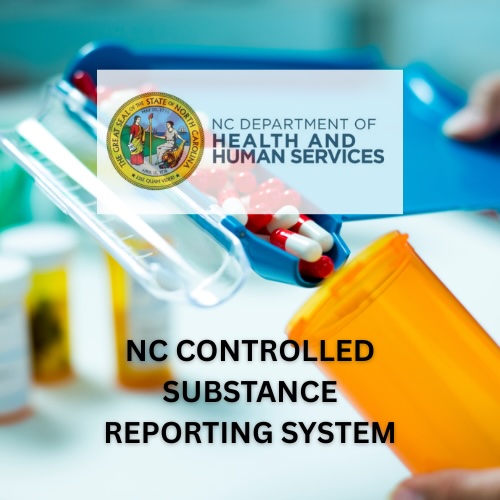
NORTH CAROLINA CONTROLLED SUBSTANCE REPORTING SYSTEM LAUNCHES LICENSED DELEGATE EXPANSION AND UNLICENSED DELEGATE SUNSETTING
On November 10, 2025, the North Carolina Controlled Substance Reporting System launched the NC CSRS Licensed Delegate Expansion and Unlicensed Delegate Sunsetting. The implementation and transition period will continue until 11/10/2026. This initiative is to expand and define the licensed delegate role for the NC CSRS, while providing a structured transition and sunsetting period for the unlicensed delegate role. [continued]
Details and NCDHHS/CSRS contact info
-

*UPDATE* STATE HEALTH DIRECTOR ISSUES STATEWIDE STANDING ORDERS IMPLEMENTING PHARMACISTS’ AUTHORITY TO TEST FOR AND TREAT INFLUENZA
Effective October 1, 2025, SL2025-37 conferred authority on pharmacists to “order and perform a CLIA-waived test and initiate treatment pursuant to the result of the CLIA-waived test for influenza in accordance with statewide protocols.” State Health Director Larry Greenblatt has issued statewide standing orders implementing this authority. [more below including POCT training options]
Details and training options
-

NORTH CAROLINA CLASS C DRIVERS LICENSE EXTENSION AND IDENTIFICATION FOR CONTROLLED SUBSTANCE DISPENSING
North Carolina law (G.S. 90-106.1) requires that a pharmacy obtain a qualifying identification prior to dispensing certain controlled substances. With respect to a qualifying identification, the statute requires that it be “valid” and “unexpired.” On July 1, 2025, Governor Stein signed into law S.L. 2025-47 and section 18 of that law states: “Notwithstanding . . . any other State law to the contrary, a Class C regular drivers license shall remain valid for purposes of establishing the license holder’s driving privilege for a period of up to two years after its expiration. [continued below]
Continued below
-

NORTH CAROLINA BOARD OF PHARMACY YOUTUBE CHANNEL
Board meetings are live-streamed and past meetings are archived here.
Subscribe Now
-

IN COORDINATION WITH THE NC PROFESSIONALS HEALTH PROGRAM
The NCBOP and NCPHP established the L. Stanley Haywood Recovery Fund in 2018. It provides financial support to qualifying pharmacy personnel in need of substance use assessment, treatment, and monitoring services. Learn more about donating or applying for assistance.
Read More -

INVESTIGATOR/INSPECTOR POSITION OPEN AT THE NORTH CAROLINA BOARD OF PHARMACY
The NC Board of Pharmacy has an opening for an Inspector/Investigator in southwestern North Carolina. Follow this link for details about the position. Anyone wishing to apply should send a resume and cover letter of interest to Rhonda Jones, Director of Finance and Human Resources, rjones@ncbop.org.
Position Description
Latest News
Looking for an archived news item? Use the global site search at the top of this page to enter keyword(s).
-
NC DHHS ISSUES EARLY MMR VACCINATION RECOMMENDATIONS
JANUARY 22, 2026
NC DHHS notes that, at this time, Buncombe County has documented measles transmission in North Carolina. As of January 20, 2026, NC DHHS is reporting 11 confirmed cases of measles. For updated information on measles cases, please see the NC DHHS Measles Dashboard. For additional information for clinical providers, including information on infection prevention and testing, please see the Measles Resources for Health Care Providers page. NC DHHS has issued provider guidance on early MMR vaccination. These recommendations concern early MMR vaccination in infants age 6-11 months residing or spending time in Buncombe County. Immunizing pharmacists do not have statutory authority to administer vaccines (by prescription or protocol) to patients under age 6. The Board is forwarding this information so that pharmacists are aware of current recommendations and are positioned to answer questions from patients and make referrals as appropriate. This DHHS resource details measles vaccine coverage in North Carolina elementary schools.
-
DRUG ENFORCEMENT ADMINISTRATION EXTENDS COVID-19 TELEMEDICINE FLEXIBILITIES FOR CONTROLLED SUBSTANCE PRESCRIPTIONS THROUGH DECEMBER 31, 2026
JANUARY 2, 2026
The Drug Enforcement Administration (DEA) and the federal Department of Health and Human Services have jointly issued a fourth temporary rule extending the current telemedicine flexibilities, which allow the prescribing of controlled substances without a prior in-person evaluation through December 31, 2026. The primary goal of this extension is to prevent a “telemedicine cliff” regarding patient access to care. This extension provides the agencies with additional time to finalize permanent regulations regarding a “Special Registration” for telemedicine practice and the prescribing of controlled substances. More information is contained in DEA’s Federal Register notification here.
-
FDA WARNS OF COUNTERFEIT OZEMPIC (SEMAGLUTIDE) FOUND IN U.S. DRUG SUPPLY CHAIN
DECEMBEr 12, 2025
FDA recently seized dozens of units of counterfeit Ozempic (semaglutide) that found their way into the U.S. drug supply chain. Counterfeit products are labeled with a PAR1229 lot number, which is not an authentic lot number. The counterfeit products labeled with lot number PAR1229 can be identified by the location of the EXP/LOT text on the pen's label. The counterfeit product has the EXP/LOT text on the left side of the expiration date and lot number, while the authentic Ozempic pen contains the EXP/LOT text above the expiration date and lot number. More information, including photographs of the counterfeit product is found here.
Patients, pharmacists, and pharmacies are strongly encouraged to check any Ozempic product in your possession. FDA provides additional information on reporting on any counterfeit products here.
-
NORTH CAROLINA DEPARTMENT OF HEALTH AND HUMAN SERVICES UPDATES RULES GOVERNING CONTROLLED SUBSTANCE RETURN AND DISPOSAL FOR LONG-TERM CARE FACILITY SERVING PHARMACIES
DECEMBER 4, 2025
NC DHHS recently completed an amendment to its rule governing the return and disposal of controlled substances from long-term care facilities. The updated rule provides more options for pharmacies. The amended rule is found here. Pharmacists or pharmacies with questions should contact NC DHHS' Drug Control Unit.
-
NORTH CAROLINA CONTROLLED SUBSTANCE REPORTING SYSTEM LAUNCHES LICENSED DELEGATE EXPANSION AND UNLICENSED DELEGATE SUNSETTING
NOVEMBER 13, 2025
On November 10, 2025, the North Carolina Controlled Substance Reporting System launched the NC CSRS Licensed Delegate Expansion and Unlicensed Delegate Sunsetting. The implementation and transition period will continue until 11/10/2026.
This initiative is to expand and define the licensed delegate role for the NC CSRS, while providing a structured transition and sunsetting period for the unlicensed delegate role. Licensed Delegates will include RN Registered Nurse, LPN Licensed Practical Nurse, CRNA Certified Registered Nurse Anesthetists, CPHT Certified Pharmacy Health Technician, RVT Registered Veterinary Technician, RDH Registered Dental Hygienist, LPC Licensed Professional Counselor, LCP Licensed Clinical Psychologist, LCAS Licensed Clinical Addiction Specialist, LCSW Licensed Clinical Social Worker, LCMHC Licensed Clinical Mental Health Counselor, and LCMHCS Licensed Clinical Mental Health Counselor Supervisor.
During the Implementation period, beginning today all licensed delegates (RN, LPN, CRNA, CPHT, RVT, RDH, LPC, LCP, LCAS, LCSW, LCMHC, and LCMHCS) may register as a Prescriber Delegate- Licensed, Pharmacist Delegate- Licensed, or Veterinarian Delegate. Any individuals with an unlicensed delegate account that qualifies as a licensed delegate should contact nccsrs@dhhs.nc.gov to request transition to a licensed delegate account; including the type of licensed delegate, their credentials and their license number. The implementation period will last for 12 months from 11/10/2025-11/10/2026, we will send out quarterly reminders during the implementation period. At the end of the implementation period, 11/10/2026, all remaining unlicensed delegate accounts will be de-activated.
Informational resources about this initiative can be found on the NCDHHS CSRS webpage, as well as quick reference resources for licensed delegates and supervising prescribers or dispensers.
Due to the anticipated volume of delegate requests to NCDHHS, the response time for delegate account transitions and questions may be up to four business days.
If you have any questions about this initiative, please reach out to the NC CSRS at nccsrs@dhhs.nc.gov.
-
*UPDATE* STATE HEALTH DIRECTOR ISSUES STATEWIDE STANDING ORDERS IMPLEMENTING PHARMACISTS’ AUTHORITY TO TEST FOR AND TREAT INFLUENZA
OCTOBER 20, 2025
Effective October 1, 2025, SL2025-37 conferred authority on pharmacists to “order and perform a CLIA-waived test and initiate treatment pursuant to the result of the CLIA-waived test for influenza in accordance with statewide protocols.” State Health Director Larry Greenblatt has issued statewide standing orders implementing this authority. The announcement is found here. The standing orders (one for testing and treatment and one for influenza prophylaxis) and supporting forms and materials are found here. Board members and staff are grateful to Dr. Greenblatt and his team at NC DHHS, Cheryl Viracola at NCAP, and the many stakeholders who contributed to this effort.
The standing order’s exercise requires pharmacists to complete an ACPE-accredited, CLIA-waived Point-of-Care Testing (POCT) training. NCAP has partnered with the National Alliance of State Pharmacy Associations (NASPA) to bring this training directly to pharmacists, pharmacy technicians, student pharmacists, and pharmacy teams. Complete details on, and registration information for, the 8-hour course (6 hours of home study; 2 hours of live instruction) found here.
-
COMPREHENSIVE GUIDANCE TO EXPANDED CLINICAL PHARMACIST PRACTITIONER (CPP) AUTHORITY
september 12, 2025
Effective October 1, 2025, changes to CPP scope of practice enacted in SL2025-37 become effective. Board staff have updated all resources in the CPP Guidance section of the Board website to reflect the changes in both CPP substantive authority and in Board staff’s revised process for reviewing and approving CPP applications. Current and aspiring CPPs should review the updated resources (including general guidance to the broadened CPP practice authority, a step-by-step guide to the revised CPP application, and edited FAQs). Board staff will begin reviewing and processing CPP applications in accordance with the revised authority and procedures immediately. CPP candidates with an application on file do not need to file a new application.
-
GABAPENTIN PRESCRIPTIONS WRITTEN BY VETERINARIANS
REMINDER SEPTEMBER 12, 2025
Board of Pharmacy staff continue to field calls regarding the state law that requires, as of March 1, 2025, all veterinary dispensations of gabapentin to be reported to the NC Controlled Substances Reporting System (NC CSRS). The North Carolina Drug Control Unit has specific guidance on veterinary gabapentin reporting, including instruction on how a pharmacy / dispenser may use the veterinarian’s North Carolina license number to report the gabapentin dispensing to the NC CSRS. The Board also has an FAQ outlining what information must be reported to the NC CSRS as well as guidance documents and contact information for NC CSRS about veterinary gabapentin reporting.
-
NORTH CAROLINA CLASS C DRIVERS LICENSE EXTENSION AND IDENTIFICATION FOR CONTROLLED SUBSTANCE DISPENSING
JULY 9, 2025
North Carolina law (G.S. 90-106.1) requires that a pharmacy obtain a qualifying identification prior to dispensing certain controlled substances. Full detail on that requirement and its application to various scenarios is found here. With respect to a qualifying identification, the statute requires that it be “valid” and “unexpired.” G.S. 90-106.1(a).
On July 1, 2025, Governor Stein signed into law S.L. 2025-47. Section 18 of that law states: “Notwithstanding . . . any other State law to the contrary, a Class C regular drivers license shall remain valid for purposes of establishing the license holder’s driving privilege for a period of up to two years after its expiration. The section shall not apply to any drivers license that is currently canceled, revoked, or suspended.” The extension applies to “Class C regular drivers licenses that expire on of after [the statute’s effective date of July 1, 2025]” and the extension “expires December 31, 2027.”
Therefore, under the plain language of S.L. 2025-47, any (non-canceled, non-revoked, non-suspended) Class C North Carolina drivers license whose printed expiration date falls on or after July 1, 2025 is “valid” and “unexpired” through December 31, 2027. As such, it may be used for dispensing controlled substances under G.S. 90-106.1 – as well as any other pharmacy activities that require production of a valid, unexpired identification.
-
*ALERT* PHARMACISTS AND PHARMACY PERSONNEL WARNED OF SCAM COMMUNICATIONS PURPORTING TO BE FROM NCBOP STAFF
Don’t fall victim to scammers! Pharmacists continue to report receiving calls from individuals purporting to be Board investigators/inspectors. The Board’s telephone number, (919) 246-1050, is often what appears on caller ID. Such calls as of late inform the pharmacist that they are the target of an investigation involving illegal drug activity and the caller sometimes claims to be part of a larger FBI (or SBI, DEA or other agency) investigation. The details and the names of the “investigator” vary, but these calls appear to be an attempt to get the recipient to disclose personal information.
Board staff reminds practitioners that the names of all the Board’s investigators are listed on the NCBOP’s website, and if they are unsure or suspicious when contacted by someone claiming to be a Board staff member (whether by phone, email, or other communication) that they should contact the Board immediately. To be sure, Board staff frequently contact pharmacists and pharmacy staff on all manner of issues. But, again, if you are suspicious about the true identity of the caller, please reach out to the Board office directly.
-
DEA DELAYS EFFECTIVE DATE OF TWO NEW RULES CONCERNING PRESCRIBING CONTROLLED SUBSTANCES VIA TELEMEDICINE
APRIL 4, 2025
The Drug Enforcement Administration has delayed the effective date of two final rules titled “Expansion of Buprenorphine Treatment via Telemedicine Encounter” and “Continuity of Care via Telemedicine for Veterans Affairs Patients” to December 31, 2025. More information found here: https://www.federalregister.gov/documents/2025/03/24/2025-05007/expansion-of-buprenorphine-treatment-via-telemedicine-encounter-and-continuity-of-care-via
As a result of this delay, The Third Temporary Extension of COVID-19 Telemedicine Flexibilities for Prescription of Controlled Medications (https://www.federalregister.gov/documents/2024/11/19/2024-27018/third-temporary-extension-of-covid-19-telemedicine-flexibilities-for-prescription-of-controlled) remains in effect and continues to allow practitioners to prescribe controlled substances via telemedicine through December 31, 2025.